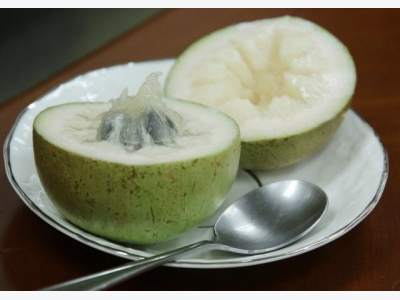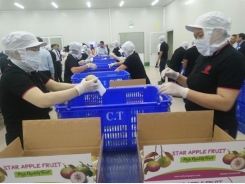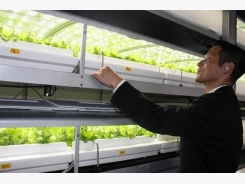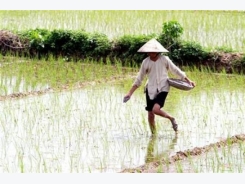Vietnam-grown star apples head for US

The tropical fruit is known for its thick skin, milky juice and sticky sweet flesh
A Vietnamese star apple is seen cut in half in this photo posted by U.S. Consul General Mary Tarnowka on her verified Facebook page.
The first shipment of fresh Vietnam-grown star apples bound for the U.S. was officially approved for import on Tuesday, marking the first time the fruit had made its way to the American market after ten years of negotiation.
The fruits are grown under strict quality control and safety standards in the commune of Vinh Kim in Chau Thanh District, Tien Giang Province, located in southern Vietnam, to satisfy requirements set out by U.S. authorities.
Star apples are named in English after the star-like structure of their cross section once cut in half and their size of a tennis ball.
In Vietnamese, the crowd-pleasing fruit is known as ‘vu sua’ (literally ‘milky breast’) thanks to the thick texture of its flesh and the sweetness of its milky white juice, as well as for how eaters are expected to gently squeeze the fruit before cutting it open to soften the flesh and enrich the juice.

Huynh Van Tho, a star apple farm owner in southern Vietnam’s Tien Giang Province, wraps the fruits to protect them from pests without using pesticides. Photo: Tuoi Tre
The ten-year journey
At a ceremony hosted by the administration of Tien Giang to commemorate the event on Tuesday, officials, farmers and fruit exporters alike rejoiced that their efforts over the past ten years to introduce locally grown star apples to the U.S. had finally paid off.
Huynh Van Tho, owner of a 4,000-square-meter star apple farm in Chau Thanh District, said he could not be happier to know eaters in the U.S. could now enjoy one of Vietnam’s most delicious fruits.
Tho was among the first farm owners in Tien Giang to sign up for a new program initiated ten years ago by the local administration to apply new farming techniques, which would require more attention to safety concerns in exchange for the chance of exporting the fruit for higher profits.
“Compliance with pesticide-free farming turned out not to be as challenging as we had imagined, and most farmers did not hesitate to follow the new requirements as long as they could sell the fruit at a higher price,” Tho said.
Cao Van Hoa, acting director of Tien Giang’s Department of Agriculture and Rural Development, said on Tuesday that local authorities and relevant bodies had been racing against the clock for the last two months to complete the necessary paperwork for the first shipment of Vietnamese star apples to the U.S.
“Representatives from U.S. authorities visited our star apple farms today [December 26] for a final inspection and signed the official approval for the fruit’s importation into their country,” Hoa said.
According to Doan Van Sang, director of Vietnam-based agricultural exporter Cat Tuong, the company’s first 120 crates of star apples had been experimentally exported to the U.S. on November 12 prior to the official green light.
Cat Tuong, which had had to upgrade their processing lines to satisfy strict safety and hygiene requirements set by U.S. authorities, is among the first Vietnamese exporters to be approved for fresh star apple exports to the North American country.
New prospects for Mekong Delta fruits
“The successful export of star apples to the U.S. has not only opened a new door for the fruit’s output but also swung wide open a larger door for fruits grown in Tien Giang and across the entire Mekong Delta region,” said Pham Anh Tuan, deputy chairman of Tien Giang.
Gerald Smith, senior agriculture attaché of the U.S. Consulate General in Ho Chi Minh City, said American citizens are as eager as Vietnamese exporters to see the star apples filling up supermarket shelves, as it would mean they would get to try the delicious fruit for the first time.
Smith looks forward to working with Vietnamese authorities on future deals to export other Vietnam-grown fruits to the U.S. and vice versa, he said.

Gerald Smith (L, 3rd), senior agriculture attaché of the U.S. Consulate General in Ho Chi Minh City, speaks with officials from Vietnam’s Ministry of Agriculture and Rural Development during a ceremony to announce the first shipment of Vietnamese star apples to the U.S., Tien Giang Province, Vietnam, December 26, 2017. Photo: Tuoi Tre
“The fact that the U.S. has agreed to import Vietnamese star apples proves once again that Vietnamese farmers have mastered the production and processing of export-quality fruits,” said Tran Thanh Nam, Vietnamese Deputy Minister of Agriculture and Rural Development.
According to Nam, until now Vietnam has secured approvals for 40 different types of fruit to be imported into 60 foreign markets.
Fruit exports brought in around US$3.5 billion in turnover in 2017, cementing Vietnam’s status as one of the world’s leading fruit exporters.
As of November 2017, around 400 hectares of farming land in Tien Giang had been dedicated to the growing of star apples, with a plan in place to expand the fruit’s production in the near future.
Star apple is among only six Vietnamese fruits allowed to enter the U.S. market in the form of fresh fruit, alongside dragon fruit, rambutan, lychee, longan and mango.
Earlier this month, the Vietnam Trade Office in the U.S. announced that Vietnam-grown mangoes had been approved to be exported to the country, with an import license set to take effect on December 29.
The approval for mango exports was one of many positive outcomes stemming from the official visit of U.S. President Donald Trump to Vietnam during the 2017 APEC Leaders’ Week in central Da Nang City last month.
Có thể bạn quan tâm
Phần mềm

Phối trộn thức ăn chăn nuôi

Pha dung dịch thủy canh

Định mức cho tôm ăn

Phối trộn phân bón NPK

Xác định tỷ lệ tôm sống

Chuyển đổi đơn vị phân bón

Xác định công suất sục khí

Chuyển đổi đơn vị tôm

Tính diện tích nhà kính

Tính thể tích ao hồ




 New finding advances wheat stem rust understanding
New finding advances wheat stem rust understanding  Vietnam 2017 coffee exports estimated down 20.1 pct…
Vietnam 2017 coffee exports estimated down 20.1 pct…